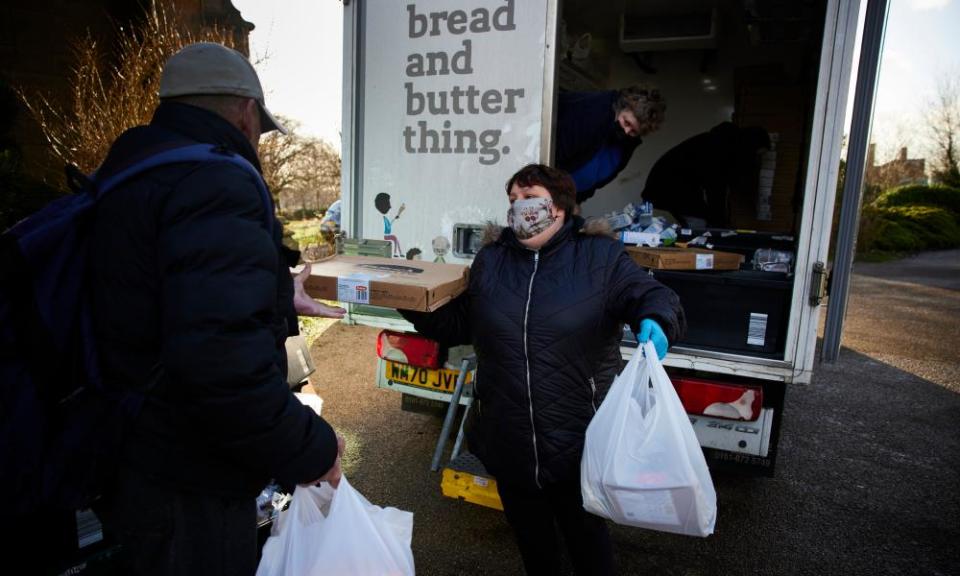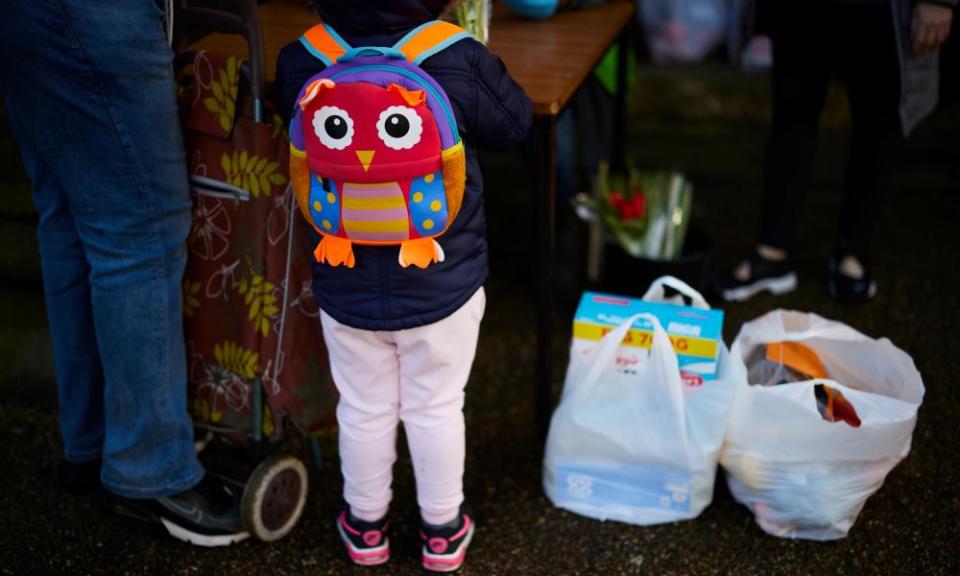How northern food clubs are helping stretch budgets in cost of living crisis

Exclusive: ‘We are bridging the gap between crisis food and supermarkets,’ says founder of the Bread and Butter Thing
“Lidl eat your heart out!” laughs a member of the Bread and Butter Thing, as he makes his way out down the path, a box of frozen steak and kidney pies balancing on his lap, and bulging carrier bags of vegetables and groceries tucked under the seat of his mobility scooter.
He is not the first satisfied customer that morning. Members of this thriving cut-price food club have been queueing around the side of St Peter’s Church in Ashton-under-Lyne, Greater Manchester, all lunchtime. The initiative helps people stretch their budgets at the best of times, but now, in a cost of living crisis, it’s a godsend.
“Speaking for myself, I haven’t had to food shop in a supermarket since November,” says Margaret Bevan, who recently came back to live in Ashton to be near her family after several years of retirement in Norfolk. “The money I save here means I can afford to switch my heating on, and that’s the difference it makes.”
The Bread and Butter Thing (TBBT) has been quietly growing for a few years, but the current economic squeeze – inflation is at a 30-year high – could see a huge expansion. The model is a kind of hyper-value weekly food shop: members pay £7.50 a week, and in return they get three pre-packed bags of healthy, high-quality surplus food with a shop value of about £35.
There are fears that the cost of living crisis could overwhelm low-income families, with energy bills expected to rise by more than 40% after April. According to the Joseph Rowntree Foundation, those increases would eat up to a fifth of the household budget for the average family, rising to 25% for single parents, and as much as 54% for single adult households on low incomes.

Talk to TBBT members, however, and you realise this is no sudden shock or one-off. Life for many in this neighbourhood has been tight for years, though things have got harder recently. Natalie Leyland, a local mother, TBBT member and volunteer, gives an example from her weekly shop. “A bag of pasta in Asda used to be £1.20; this week it was £1.39. But my benefits haven’t gone up.”
Indeed, she points out, her benefits have actually gone down, as the government withdrew the £20-a-week universal credit Covid top-up back in October. On top of that, there are council tax increases and rent top-ups to pay, and then the scarcely comprehensible energy bill rises. “The government have got it all wrong,” she says. “They should raise benefit rates or get energy capped.”
Leyland is not alone. A survey of 2,000 TBBT members in November found that almost nine out of 10 said they were “worried” about energy costs this winter, with 38% saying they would not be able to pay their bills. One in four said they would have to borrow money to pay their energy bill, and almost half said they would cut down on energy use. Families with three children or more are most fearful, while those on universal credit or other benefits are twice as likely to go into debt to pay energy bills.
“Everything is going up in price, but the pound in your pocket is worth less than it’s ever been,” reflects Craig, a 42-year-old father and full-time carer standing in the queue by St Peter’s. “I had an email the other week telling me the gas and electric is going up by £1,500 this year. To be honest it works out cheaper to buy oversized fleece-lined hoodies for everyone than to have the heating on for a week. It’s that sort of scenario now.”
People are having to choose to get the heating on or feed the children
What about “heat or eat”, the perennial winter dilemma of the UK’s hard-up? “Not yet, thank God,” he says. “The kids would come first, no matter what. They’d eat a meal; I’d have a sandwich. We’ve got a good family; they’d bail us out, but we are in 2022 – you don’t want to be going cap in hand to your parents.”
There are currently more than 22,000 TBBT members attached to 56 hubs (pop-up weekly distribution venues) in some of the most economically deprived neighbourhoods of Greater Manchester and the north-east of England, many of them in “food deserts” poorly served by supermarkets. Last year it distributed about 50,000 tonnes of food.
It is a registered charity, though its founder, Mark Game, sees it as more of a non-profit food retail business. TBBT, he says, is essentially a weekly veg box for people on low incomes who are struggling but want good-quality food and like a bargain. He treats his members as customers, not beneficiaries, as people who are making active choices in the food they buy. They often shop at both TBBT and the supermarket.
Game is slightly irked by comparisons to food banks. Unlike many food banks, TBBT members do not need a referral and there is no requirement to “prove” dire hardship. There is a strong social and self-help element. It is not the full-on retail experience, nor is it charity. “We are bridging the gap between crisis food and supermarkets,” he says.

Game says his customers are perhaps not the ones in the most extreme need but those who have times when they struggle, not dissimilar to Theresa May’s “just about managing families”. They are probably in the bottom quarter of income, and often food-insecure, but not destitute and not in need – yet – of emergency food. “[Our customers] are being hit hard now,” says Game. “Brexit, Covid, the energy crisis and no real increase in incomes.”
Inside the church, the food bags are packed with practised efficiency. This week there are blackberries, asparagus and spring onions, as well as such staples as apples, oranges and potatoes. The next line of bags contains eggs, butter, cereal and Marmite, and the final line of bags has chilled goods: sausages, goat milk, strawberries and pies. “Food you wouldn’t be able to afford to buy,” says one member. All of this was heading to landfill or animal feed before TBBT stepped in.
Dr Megan Blake, a senior lecturer at Sheffield University and a food security expert, says the TBBT model offers positive support for struggling families: “In the current context, where prices are increasing and energy costs rising, it helps keep the tide back, but it is not enough on its own; we do need a government policy shift.”
Amid the positivity of TBBT, there is a lot of barely contained anger at the wider social issues, not least the sense that privileged politicians have little clue about the reality of life close to the breadline. “People are having to choose to get the heating on or feed the children,” says Tanya Ladley, a TBBT member and volunteer from nearby Guide Bridge. “The poverty is disgusting. I’ve never known it so bad.”
As the food club packs up and the last customers leave, there is a feeling that with the right backing, the TBBT could and should reach a lot more people. Bevan, a TBBT member and volunteer, says: “We don’t want to be perceived as ‘poor northerners’ and we are not. We are typical people trying to make our money go further and that’s it. That’s why people are happy to come here.”

 Yahoo Movies
Yahoo Movies 
